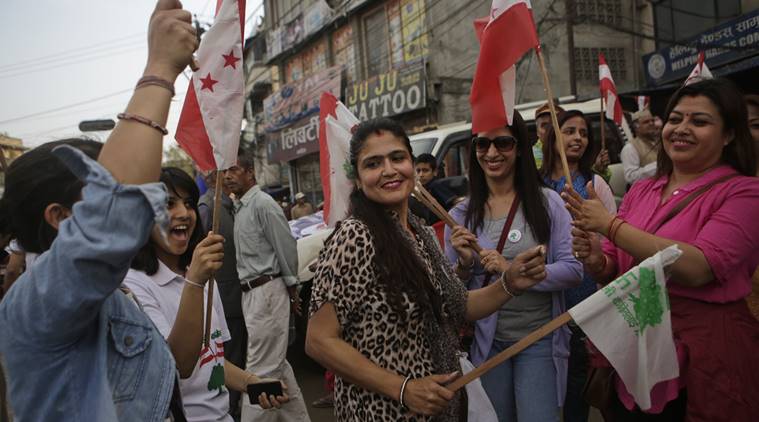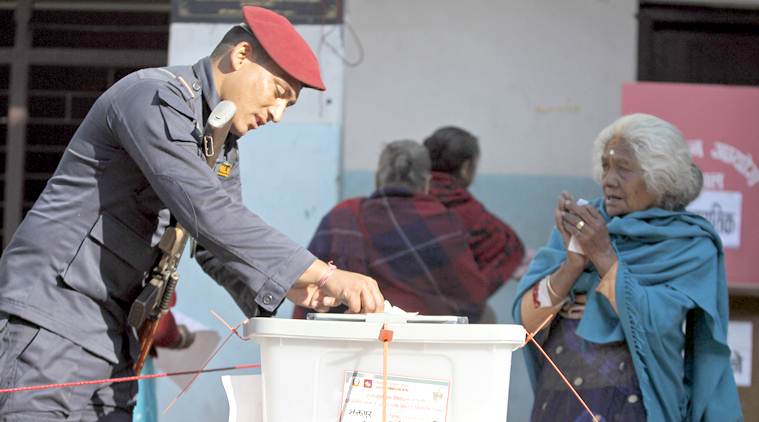
Analyzing Election Violence in South Asia

In this May 11, 2017 photo, supporters of Nepali Congress party march during an election campaign event in Bhaktapur, Nepal. (AP Photo/Niranjan Shrestha)
Pakistan, Afghanistan, and Nepal all held national elections between late 2017 and mid-2018. All three experience significant election security concerns due to political violence that targets campaign events, infrastructure, and political leaders themselves. While this violence focused on election disruption, the scope, targets, and attack methods varied from country to country.
Leading up to the election, the three regions were targeted differently. In Pakistan, terroristic violence targeted campaign events and candidates. These politically influenced attacks included a suicide bombing on July 13th in Mastung resulting in 149 people dead including Balochistan Awami Party leader and political candidate Siraj Raisani.
The attack, later claimed by ISIS, was the third deadliest in Pakistan’s history. Raisani was not the only candidate killed. Other murdered candidates included Haroon Bilour and Ikramullah Gandapur. Candidates Arkham Durrani and Dawood Khan Achakzai survived pre-election attempts on their lives. All of the attacks were organized and executed by skilled, experienced strategists.
Afghanistan’s parliamentary elections have been delayed since 2016, with voting set to take place on October 20th, 2018. Attacks in Afghanistan targeted electoral institutions, including the bombing of voter registration centers and the assassination of election officials. An attack claimed by ISKP killed 57 outside a Kabul voter registration center.
Like the Pakistan attacks, these, perpetrated by the Taliban and a few by ISIS, were well orchestrated and highly effective. Between April 1st and June 13th, more than 100 Afghans were killed in election violence. Afghanistan was also plagued by non-electoral violence, perhaps prompted by election-related instability, during this period.
This includes a June 20th attack wherein Taliban militants attacked a military base and killed 30 Afghan soldiers, followed by an attack on July 3rd wherein a car bomb, targeting a foreign military convoy, detonated. Another example is a July 7th attack which saw a police convoy ambushed by Taliban fighters in the Ghazni province, leaving four officers dead and six wounded.
For planned attacks such as these that are heavily reliant on timing, terrorist organizations require intelligence, location analysis for the strategic placement of IEDs, and experienced members to successfully execute the attacks.
Nepal held legislative elections in stages between May and December 2017, and presidential elections in March 2018. These elections transpired despite contention surrounding federalism and provincial-level voting within the rewrite of the Nepalese constitution.
While the campaign silence period and voting day for the legislative elections’ first phase were largely peaceful, the campaign period itself saw the use of IEDs targeting political leaders and campaign events. There were 72 instances of election violence in these elections and 161 in the three phases of local and provincial elections.
Compared to the attacks in Afghanistan and Pakistan, pre-election attacks in Nepal appear to lack planning and clear goals. Civilian locations such as a jewelry store, a hydropower project, and a cell tower, were targetted rather than locations or people connected with the opposition. No active Nepalese terrorist group formally claimed responsibility for the attacks.
In Nepal, the presidency is a ceremonial role. Consequently, there is less incentive to carry out election violence before a presidential vote. However, there was a significant uptick in overall political incidents prior to these elections. These included a number of attacks on civilian infrastructure and clashes involving politically-motivated, although not necessarily terrorist, groups.
Pakistan, Afghanistan, and Nepal all experienced terrorism that was intended to disrupt elections prior to their national votes. However, the threats faced by these countries diverged in terms of target type and tactics. ISKP and the Taliban carried out attacks on election infrastructure including voter registration centers and election officials, while Nepal suffered attacks against civilian infrastructure and clashes between opposing political parties.

A Nepalese policeman helps a woman to cast her vote during the legislative elections in Thimi, Bhaktapur, Nepal. (AP Photo/Niranjan Shrestha)
